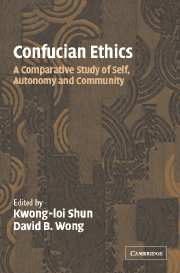Book contents
- Frontmatter
- Contents
- Contributors
- Contributors
- Introduction
- SECTION I RIGHTS AND COMMUNITY
- SECTION II SELF AND SELF-CULTIVATION
- 5 Tradition and Community in the Formation of Character and Self
- 6 A Theory of Confucian Selfhood: Self-Cultivation and Free Will in Confucian Philosophy
- 7 The Virtue of Righteousness in Mencius
- 8 Conception of the Person in Early Confucian Thought
- SECTION III COMMENTS
- Glossary of Chinese Terms
- Index
7 - The Virtue of Righteousness in Mencius
Published online by Cambridge University Press: 08 December 2009
- Frontmatter
- Contents
- Contributors
- Contributors
- Introduction
- SECTION I RIGHTS AND COMMUNITY
- SECTION II SELF AND SELF-CULTIVATION
- 5 Tradition and Community in the Formation of Character and Self
- 6 A Theory of Confucian Selfhood: Self-Cultivation and Free Will in Confucian Philosophy
- 7 The Virtue of Righteousness in Mencius
- 8 Conception of the Person in Early Confucian Thought
- SECTION III COMMENTS
- Glossary of Chinese Terms
- Index
Summary
In not isolating a privileged conception of moral guilt, and in placing under a broader conception of shame the social and psychological structures that were near to what we call “guilt,” the Greeks, once again, displayed realism, and truthfulness, and a beneficent neglect.
– Bernard Williams Shame and NecessityThe shamefulness of being without a sense of shame is shameless indeed.
– MenciusOf the four cardinal virtues of the Platonic and Thomistic traditions (wisdom, justice, courage, and moderation), only one corresponds, even approximately, to any of the four cardinal Mencian virtues (benevolence, righteousness, propriety, and wisdom). Consequently, philosophers who study virtue should find Mencius a rich resource. Unfortunately, there are not many detailed published studies of the Mencian virtues. In this paper, I want to examine in some depth Mencius' understanding of the virtue of yi, conventionally translated as “righteousness.” In Section I, I lay the background for my discussion of righteousness by outlining the Mencian view of self-cultivation and the virtues as a whole. In Section II, I examine how the virtue of righteousness is related to the key Mencian notion of “extension.” In Section III, I discuss the relationship between righteousness and shame. Finally, in Section IV, I briefly discuss some of the philosophical problems raised by Mencian righteousness.
- Type
- Chapter
- Information
- Confucian EthicsA Comparative Study of Self, Autonomy, and Community, pp. 148 - 182Publisher: Cambridge University PressPrint publication year: 2004
- 9
- Cited by



